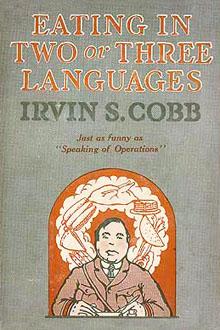'Oh, Well, You Know How Women Are!', Irvin S. Cobb and Mary Roberts Rinehart [top 10 novels .TXT] 📗

Book online «'Oh, Well, You Know How Women Are!', Irvin S. Cobb and Mary Roberts Rinehart [top 10 novels .TXT] 📗». Author Irvin S. Cobb and Mary Roberts Rinehart
Really, this article could run on forever. There’s that particularly manlike attitude of accusing women of slavishly following the fashions! Funny, isn’t it, when you think about it? Do you think a man would wear a striped tie with a morning coat when his haberdasher says others are wearing plain gray? Or a straw hat before the [p30] fifteenth of May? Have you ever watched the mental struggle between a dinner suit and evening clothes? Do you suppose that women, realizing that the costume they wore was the ugliest ever devised, would continue wearing it because everyone else did? And then look at men’s trousers and derby hats!
It is men who are the slaves, double chained, of fashion. The only comfortable innovation in men’s clothes made in a century was when some brave spirit originated the shirtwaist man. Women saw its comfort, adopted and retained the shirtwaist. But the leaders of male fashion dictated that comfort was bad form, and on went all the coats again. Irvin Cobb is undoubtedly going to say that it is just like a woman to wear no flannels in winter, and silk hose, and generally go about half clad. But men are as over-dressed in summer as women are under-dressed in winter.
But in spite of this slavish following of fashion, men are really more rational than women. They have the same mental processes. For that reason they understand each other. Like the village fool who found the lost horse by thinking where he would go if he were a horse, a man knows what another man will do by fancying himself in the same circumstances. And women are called designing because they have fathomed this fundamental simplicity of the male! A woman’s emotions and her sensations and her thoughts are all [p31] complexes. She doesn’t know herself what she is going to do, and is frequently more astounded than anyone else at what she does do. It’s a lot harder being a woman than a man.
So—women know men better than men know women, and are rather like the little boy’s definition of a friend: “A friend is a feller who knows all about you, and likes you anyhow.”
We do like them, dreadfully. Sometimes women have sighed and wondered what the house would be like without overcoats thrown about in the hall, and every closet full of beloved old ragged clothes and shoes, and cigar ashes over things, and wild cries for the ancient hat they gave the gardener last week to weed in. But quite recently the women of this country and a lot of other countries have found out what even temporary absence means. A house without a man in it is as nice and tidy and peaceful and attractive and cheerful as a grave in a cemetery. It is as pleasant as Mark Twain’s celebrated combination of rheumatism and St. Vitus dance, and as empty as a penny-in-the-slot chocolate machine in a railway station.
Not so very long ago there was a drawing in one of the magazines. It showed a row of faces, men with hooked noses, with cauliflower ears, with dish-faces, and flat faces, with smallpox scars, with hare lips. And underneath it said: “Never mind, every one of them is somebody’s darling.”
[p32]
Women don’t really care how their men look. But they want to look up to them—which is a reason I haven’t given before for their sex superiority. It is really forced on them! And they want them kind and even a bit patronizing. Also they want them well, because a sick man can come the closest thing in the world to biting the hand that feeds him. And loyal, of course, and not too tidy—and to be hungry at meals. And not to be too bitter about going out in the evenings.
And the one thing they do not want is to have their men know how well they understand them. It is one of their pet little-boy conceits, this being misunderstood. It has survived from the time of that early punishment when each and every one of them contemplated running off and going to sea. Most of them still contemplate that running off. They visualize great spaces, and freedom, and tropic isles, and—well, you know. “Where there ain’t no Ten Commandments and a man can raise a thirst.” (You know, Irvin!)
Yes, they contemplate it every now and then, and then they go home, and put on a fresh collar for dinner, and examine the vegetable garden, and take the children out in the machine for a few minutes’ fresh air, and have a pillow fight in the nursery, and—forget the other thing.
Which is exactly like a man.
1. Will probably forget small attentions to his wife after marriage.
2. Will always remember small attentions to his wife after marriage, especially when conscience troubles him.
3. Receives constant attention from his family after marriage.
End of the Project Gutenberg EBook of 'Oh, Well, You Know How Women Are!' AND 'Isn't That Just Like a Man!', by Irvin Shrewsbury Cobb and Mary Roberts Rinehart




Comments (0)